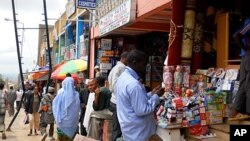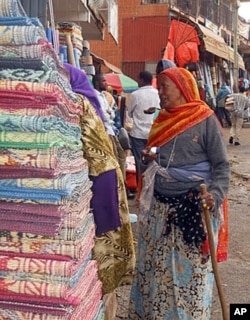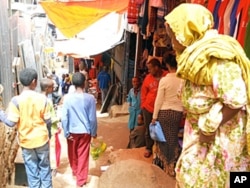Only 200 miles from the border of Somalia is the Ethiopian city of Harar, an ancient center of commerce linking Africa to the Arab world. Nowadays, the old merchant route is still tread regularly. Smugglers carry everything from cell phones to satellite dishes into Ethiopia daily, unhindered by taxes and law, dominating local markets.
It works like this: ordinary people – old people, young people, men and women – take the bus from the eastern Ethiopian city of Harar, to Hargeisa, the capital of Somaliland.
The bus ride to Somaliland costs about nine dollars and takes the better part of the day. Once in Hargeisa, the passengers hit the markets and buy cell phones, DVD players, T-shirts, cosmetics and just about everything else. They stash the goods in cloth bags, or under heavy sweaters. They pay the bus driver about $20 to go back.
Outside her small stone home in Harar's thousand-year-old walled city, 20-year-old Naima, a smuggler, grinds coffee beans by hand, pounding them in a centuries-old tradition.
Naima says she makes the trip to Somaliland about once a week with more than 20 other smugglers. The trip back to Harar cost more than twice as much because the bus driver knows they are carrying smuggled goods. If they are caught, she says, the smugglers usually only have their goods confiscated. The bus drivers, however, face fines or imprisonment.
Before military checkpoints, Naima says, the smugglers exit the bus and haul their goods on foot for hours through remote villages before they meet their bus again.
Small-scale smugglers make between $15 to $40 a trip. Their earnings average about $3.50 per day, in a country where about 80 percent of the people live on less than $2 a day. Naima says it is a good living for a single girl with no children. And with jobs scarce in the impoverished country, she says she has few other choices while she is in school. After she graduates from college, Naima wants to teach the Harari language to local children.
Smugglers say crossing the border into what is technically Somali territory is not as dangerous as you might think. They are quick to point out that Hargeisa is in Somaliland, which is separate from the war-ravaged territories of southern Somalia, a country deemed by the international community a "failed state."
Somaliland is a self-declared independent republic that covers most of northern Somalia along the Gulf of Aden. Unlike its southern neighbor, Somaliland is mostly peaceful, and it says it is open for business.
Ethiopian officials say that the road from Hargeisa to Harar has long been alive with illegal trafficking of consumer goods.
In January, a coalition of Ethiopian authorities and phone companies said that 95 percent of cell phones in Ethiopia were smuggled in, costing the government about $50 million a year in lost tax revenue.
But government authorities say the flow of smuggled goods into Ethiopia has slowed considerably in the past two years after an overhaul of customs laws in 2008. This year, the Ethiopian customs authority doubled its budget for informants to about $1.3 million. If caught, smugglers and anyone who purchases smuggled goods can go to jail for as many as 15 years.
But in the bustling markets of Harar, shopkeepers say the only way to do business in this town is to buy from smugglers.
Mutagas, a 16-year-old shopkeeper leans out of his electronics stall in a crowded indoor market. The narrow paths are packed with tiny shops selling shoes, clothes, cosmetics and just about every kind of electronic gadget. Like the other shopkeepers, he is not shy about admitting that his goods were purchased illegally.
He says modern store owners in Harar buy goods illegally because they cost about 40 percent less than taxed goods. And as often as not, he says the sellers, like the merchants of old, carry their goods to market on the backs of donkeys and camels.







